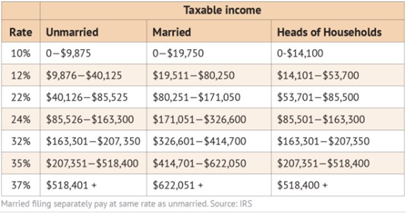Roth IRA Conversions: Pay Now, Live Tax-Free Later
Why now may be the time to convert your traditional IRA to a Roth to avoid future taxes.


Profit and prosper with the best of Kiplinger's advice on investing, taxes, retirement, personal finance and much more. Delivered daily. Enter your email in the box and click Sign Me Up.
You are now subscribed
Your newsletter sign-up was successful
Want to add more newsletters?

Delivered daily
Kiplinger Today
Profit and prosper with the best of Kiplinger's advice on investing, taxes, retirement, personal finance and much more delivered daily. Smart money moves start here.

Sent five days a week
Kiplinger A Step Ahead
Get practical help to make better financial decisions in your everyday life, from spending to savings on top deals.

Delivered daily
Kiplinger Closing Bell
Get today's biggest financial and investing headlines delivered to your inbox every day the U.S. stock market is open.

Sent twice a week
Kiplinger Adviser Intel
Financial pros across the country share best practices and fresh tactics to preserve and grow your wealth.

Delivered weekly
Kiplinger Tax Tips
Trim your federal and state tax bills with practical tax-planning and tax-cutting strategies.

Sent twice a week
Kiplinger Retirement Tips
Your twice-a-week guide to planning and enjoying a financially secure and richly rewarding retirement

Sent bimonthly.
Kiplinger Adviser Angle
Insights for advisers, wealth managers and other financial professionals.

Sent twice a week
Kiplinger Investing Weekly
Your twice-a-week roundup of promising stocks, funds, companies and industries you should consider, ones you should avoid, and why.

Sent weekly for six weeks
Kiplinger Invest for Retirement
Your step-by-step six-part series on how to invest for retirement, from devising a successful strategy to exactly which investments to choose.
There was a lot of discussion around tax increases in the run-up to the election. On one side, raising taxes on corporations and on ultra-high net worth individuals. The other side focusing on foreign taxes and tariffs. The one thing everyone can agree on is that taxes are going to go up in the future.
The United States has over $27 TRILLION in debt, which is climbing rapidly. The government has issued billions in Coronavirus stimulus packages, and unemployment hit 13% in May, the second highest rate since World War II. We also have a Social Security system that is quickly running out of money. There is a clear need for more tax dollars.
No matter where the focus (corporations, ultra-high net worth individuals or foreign countries), there is always a tax burden that falls on everyday Americans. It is fair to assume that burden will likely grow in the future. So how can you set yourself up now for what may lie ahead?
From just $107.88 $24.99 for Kiplinger Personal Finance
Become a smarter, better informed investor. Subscribe from just $107.88 $24.99, plus get up to 4 Special Issues

Sign up for Kiplinger’s Free Newsletters
Profit and prosper with the best of expert advice on investing, taxes, retirement, personal finance and more - straight to your e-mail.
Profit and prosper with the best of expert advice - straight to your e-mail.
How Do Roth IRA Conversions Work?
Roth conversions are the best way to take a little pain today to give yourself options in the future. A Roth conversion is when you take money out of a traditional IRA and transfer it directly into a Roth IRA. When you do this, the amount converted IS taxable. You pay income tax on the entire amount moved into your Roth IRA.
Once it is in the Roth IRA, the growth is tax-free. As long as you have had the account for five years and you are 59½ or older, you can take the entire amount of a Roth IRA out tax-free.
What Are the Benefits?
Tax-Free Growth
If we are under the assumption that taxes will go up in the future, it makes sense to pay taxes on some of your money now to avoid taxes at higher rates in the future. For example, according to U.S. Census Bureau, the median household income in 2019 was $65,712. The standard deduction this year for a married filing jointly household is $24,800. That leaves an adjusted income amount of $40,912. Based on 2020 tax brackets (see chart below), this places the median household in the 12% tax bracket. This bracket goes up to $80,250 worth of income.
So, there is room for nearly another $40,000 before the median household moves up to the 22% bracket. That is $40,000 of opportunity. Opportunity to convert $40,000 from traditional IRA monies to a Roth IRA. You pay 12% in federal income taxes to move this money, but the way I see it that could be a steal in the future.

Lower RMDs on Your Traditional IRAs in the Future
Required minimum distributions (RMD) are due in April the year following your 72nd birthday. An RMD is a set percentage of your traditional IRA that you must withdraw for that given year. The percentage you must take out also increases over time. One hundred percent of required minimum distributions are taxed like income, and you cannot convert RMDs. These required withdrawals may be more money than you can spend, but it doesn’t matter, they are REQUIRED. By doing Roth IRA conversions in your 50s and 60s, you are reducing the value of your traditional IRAs. Therefore, when your 70s come around, your RMD amounts will be smaller. This will minimize the taxation on your traditional IRA in the future and make tax-free dollars available in your Roth IRA for supplemental income.
The Ability to Leave a Tax-Free Estate
One of the biggest negatives to the SECURE Act is the rules on inheritances. Before the SECURE Act, beneficiaries could stretch inherited IRAs over their entire lifetime. Now, with only a few exceptions, beneficiaries have 10 years to withdraw the entire amount of inherited IRAs and inherited Roth IRAs. That means 10 years to pay the taxes on inherited IRAs.
Typically, when you’re inheriting an IRA from Mom or Dad, you are in your prime working years, making more money than you ever had. Now, when you take that money from the inherited IRA you’re paying taxes at your high, working tax rate. This can end up with Uncle Sam getting 40% of your IRA through taxes. On the flip side, inherited Roth IRAs remain tax-free for the beneficiary. Paying taxes on your IRA in your 50s and 60s can help save taxes for you in retirement AND your children after you die.
Some People Who Should Think Twice before Doing a Roth IRA Conversion
The idea of doing a Roth conversion is to have a little pain now by paying the tax to have no pain or tax-free dollars in the future. Therefore, if you are a high-income earner now, a Roth conversion may not make sense for you. This is the case for many who will be in a lower tax bracket in the future. If you were to make a large conversion now, you would pay taxes at your high rate to not pay taxes at your lower future retirement rate. In this scenario, it wouldn’t make sense to utilize Roth conversions. (For more, please see 6 Reasons You Should NOT Do a Roth Conversion.)
The Bottom Line on Roth IRA Conversions
Nobody enjoys paying taxes. However, it may be in your best interest to pay more in taxes now to set yourself up to have tax-free income in the future. Giving Uncle Sam nickels and dimes today can keep dollar bills for you and your family in the future.
Profit and prosper with the best of Kiplinger's advice on investing, taxes, retirement, personal finance and much more. Delivered daily. Enter your email in the box and click Sign Me Up.

Phil Huff is the vice president and investment adviser representative licensed with Independence Wealth Advisors LLC, a registered investment adviser. As a former offensive lineman for Kent State University, he excels at protecting people. His focus is on optimizing his clients’ life savings throughout retirement by taking a holistic approach to planning, developing and implementing personalized investment plans, retirement income planning and risk management.
-
 Nasdaq Leads a Rocky Risk-On Rally: Stock Market Today
Nasdaq Leads a Rocky Risk-On Rally: Stock Market TodayAnother worrying bout of late-session weakness couldn't take down the main equity indexes on Wednesday.
-
 Quiz: Do You Know How to Avoid the "Medigap Trap?"
Quiz: Do You Know How to Avoid the "Medigap Trap?"Quiz Test your basic knowledge of the "Medigap Trap" in our quick quiz.
-
 5 Top Tax-Efficient Mutual Funds for Smarter Investing
5 Top Tax-Efficient Mutual Funds for Smarter InvestingMutual funds are many things, but "tax-friendly" usually isn't one of them. These are the exceptions.
-
 Social Security Break-Even Math Is Helpful, But Don't Let It Dictate When You'll File
Social Security Break-Even Math Is Helpful, But Don't Let It Dictate When You'll FileYour Social Security break-even age tells you how long you'd need to live for delaying to pay off, but shouldn't be the sole basis for deciding when to claim.
-
 I'm an Opportunity Zone Pro: This Is How to Deliver Roth-Like Tax-Free Growth (Without Contribution Limits)
I'm an Opportunity Zone Pro: This Is How to Deliver Roth-Like Tax-Free Growth (Without Contribution Limits)Investors who combine Roth IRAs, the gold standard of tax-free savings, with qualified opportunity funds could enjoy decades of tax-free growth.
-
 One of the Most Powerful Wealth-Building Moves a Woman Can Make: A Midcareer Pivot
One of the Most Powerful Wealth-Building Moves a Woman Can Make: A Midcareer PivotIf it feels like you can't sustain what you're doing for the next 20 years, it's time for an honest look at what's draining you and what energizes you.
-
 I'm a Wealth Adviser Obsessed With Mahjong: Here Are 8 Ways It Can Teach Us How to Manage Our Money
I'm a Wealth Adviser Obsessed With Mahjong: Here Are 8 Ways It Can Teach Us How to Manage Our MoneyThis increasingly popular Chinese game can teach us not only how to help manage our money but also how important it is to connect with other people.
-
 Looking for a Financial Book That Won't Put Your Young Adult to Sleep? This One Makes 'Cents'
Looking for a Financial Book That Won't Put Your Young Adult to Sleep? This One Makes 'Cents'"Wealth Your Way" by Cosmo DeStefano offers a highly accessible guide for young adults and their parents on building wealth through simple, consistent habits.
-
 Global Uncertainty Has Investors Running Scared: This Is How Advisers Can Reassure Them
Global Uncertainty Has Investors Running Scared: This Is How Advisers Can Reassure ThemHow can advisers reassure clients nervous about their plans in an increasingly complex and rapidly changing world? This conversational framework provides the key.
-
 I'm a Real Estate Investing Pro: This Is How to Use 1031 Exchanges to Scale Up Your Real Estate Empire
I'm a Real Estate Investing Pro: This Is How to Use 1031 Exchanges to Scale Up Your Real Estate EmpireSmall rental properties can be excellent investments, but you can use 1031 exchanges to transition to commercial real estate for bigger wealth-building.
-
 Should You Jump on the Roth Conversion Bandwagon? A Financial Adviser Weighs In
Should You Jump on the Roth Conversion Bandwagon? A Financial Adviser Weighs InRoth conversions are all the rage, but what works well for one household can cause financial strain for another. This is what you should consider before moving ahead.